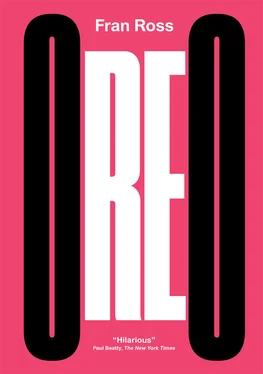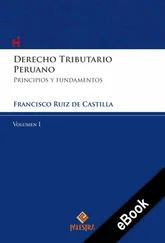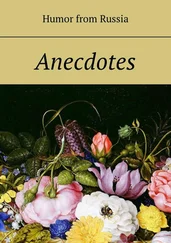A peek at Jacob
Jacob lived on the Upper West Side of New York City. The first thing you noticed about him was that his upper middle incisors did not line up with the center of his face. A line drawn through the interstice of the two teeth would bisect not the septum but his left nostril. This gave the impression either that his face was off-center or that his false teeth had not quite settled around his gums. But his teeth were his own. Had they been false, he would have had a better set made. All his life, everybody and his brother had driven him meshugge cocking their heads this way and that whenever they talked to him. Everybody, that is, except his Frieda, rest in peace, whose neck and therefore head had been permanently set at an angle on her shoulders ever since her Uncle Yussel, klutz, had missed when he was playing upsy-daisy with her when she was six months old.
“Another year, another yahrzeit , ” he sighed. “Two years already have passed and still I can’t bring myself to go into my Frieda’s room. In there are all her plants. She loved plants.” He gestured helplessly to his neighbor, Pinsky, apartment 5-E. “Pinsky, she would talk to them, what can I tell you, like she was having a shmooz with her friends.” He wept yet again when he thought of his wife’s devotion to her greenery.
An hour later Bessie, the cleaning woman, came in to do her daily chores. She decided to take care of the dead lady’s plants first, before her corns started tom-tomming (“Sit down— bam! — ’fore you — double wham! — fall down — boom! Would I— boom-boom! — treat you this way? — wham-boom-bam ?”). “Lord have mercy, that woman do have some plants,” she said as she took out her feather duster and opened the door on one of the largest collections of plastic plants in America.
Food
Louise Clark’s southern accent was as thick as hominy grits. No one else in the Philadelphia branch of the family had such an accent. Her mother and father had dropped theirs as soon as they crossed the Pennsylvania state line. Her husband could have been an announcer for WCAU had they been hiring 10’s when he was coming up. While all about her sounded eastern-seaboard neutral, why did she persist in sounding like a mush-mouth? One reason: most of the time her mouth was full of mush or some other comestible rare or common to humankind.
Louise was once challenged to name a food she did not like. She paused to consider. That pause was now in its fifteenth year. During that time, she spoke of other things, lived her life, paid attention to what was going on, to all appearances; but all the while — simmering on a back burner, as it were — she was trying to bring to the boil of consciousness the category of food she had once tasted at Ida Ledbetter’s second child’s husband’s cousin’s wake after Ida Ledbetter’s second child’s husband’s cousin’s mother had collapsed after dishing out the potato salad. She would go to her reward without putting a name to that food, which was not food at all but a frying pan full of Oxydol. Why the Oxydol was in the frying pan in the first place is beyond the scope of this work, but when Louise had walked by the stove, she had hand-hunked a taste. Her judgment was that, whatever it was, someone had been a mite too heavy-handed with the salt. Thus, this was not truly her first antifood opinion but, rather, her first (and only) anti seasoning decision, an important subcategory.
She always looked with perfect incomprehension on those finicky eaters who said that so-and-so’s spaghetti sauce was too spicy, her greens too bland, her sweet potatoes too stringy. For Louise, nothing to eat was ever too sour, salty, sweet, or bitter, too well done or too rare, too hot or too cold. Anything that could be subsumed under the general classification “Food” was exempt from criticism and was endued with all the attributes of pleasure. Consequently, anything Louise liked was compared, in one way or another, with food. A free translation of what she said on her wedding night after James went into his act would be: “The blacker the berry, the sweeter the juice.”
Aside on Louise’s speech
From time to time, her dialogue will be rendered in ordinary English, which Louise does not speak. To do full justice to her speech would require a ladder of footnotes and glosses, a tic of apostrophes (aphaeresis, hyphaeresis, apocope), and a Louise-ese/English dictionary of phonetic spellings. A compromise has been struck. Since Louise can work miracles of compression through syncope, it is only fair that a few such condensations be shared with the reader. However, the substitution of an apostrophe for every dropped g , missing r , and absent t would be tantamount to tic douloureux of movable type. To avoid this, some sentences in Louise-ese have been disguised so that they are indistinguishable from English. In other cases, guides to pronunciation and/or variant spellings are given parenthetically whenever absolutely necessary to preserve the flavor and integrity of the Louise-ese or, antithetically, translations are provided for relict English words, phrases, or sentences that survive her mangle-mouth.
Back to food
Fortunately for her family, who did not share her universal palate, Louise was a cook for the ages, adept at unnumbered ethnic and international cuisines, her shrewd saucisson-en-croûte surviving even her attempts to pronounce it to take its place on the dining-room table, in due course, beside her butter-blinded pommes de terre Savoyard , her brave corn pudding, untouchable beef curry, toe-tapping hopping john, auto-da-fé paella , operatic vitello tonnato , and soulful hog maws.
One of Helen’s earliest memories was of sitting on her mother’s lap and being urged to “tayce dis yere tornado Bernice” (taste this here tournedos Béarnaise ) as she looked over her mother’s shoulder to compare Louise’s startlingly white face with the portrait of her grandfather, a 1 if there ever was one. The portrait hung in an oval frame in the dining room. Helen’s grandfather had been the offspring of an enterprising African woman who had immigrated to New York in 1869 and had had a hand in the somewhat unfortunate attempt to corner the gold market (“Black Friday” was named after her) and a Richmond bugler who had been a turncoat during the Civil War and was vamping in the Bronx until he felt it was safe to tootle back to Virginia. Her grandmother was said to be half Cherokee and half French — hence the influence of French cuisine in the family, the oldest handed-down-from-generation-to-generation recipe being a providential dish called rabbit-on-the-run suprême , in commemoration of the French and Indian Wars. The last joke James Clark heard before his immobilization was his daughter’s rather feeble “Just think. Daddy, now I can call myself Hélène Sun-See-A-Ray Schwartz.”
More about Louise
Louise went gray at thirty-two trying to understand what her husband and child were saying when they talked that foolish talk they talked sometimes. (“You’re draying me such a kop with that racket, Honeychile,” said the father. “ Kvetch, kvetch ,” said the daughter under her breath.) She had her “good” hair dyed auburn, a color and texture that she never failed to compare favorably with the dull black kinks of her neighbors as she waited her turn while the beautician straightened their nappy heads with the hot comb (or “cum,” as Louise pronounced it, with the u of “put”). “I thank you, Father,” she would pray, “fo’ gib’m me de gray hairs, but I truly thank you fo’ gib’m folks de knowledge so I don’ hafta hab’m. I’d look like a f -double o-l walkin’ ’round yere wif a gray head, young’s I am.”
Читать дальше












